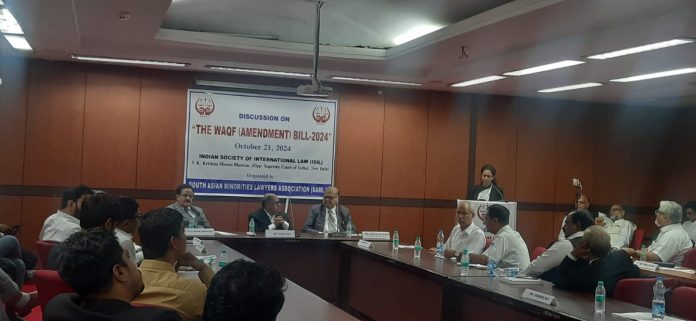New Delhi: The South Asian Minorities Lawyers Association (SAMLA), a pan-Indian organization of lawyers practising in the Supreme Court, High Courts, and District Courts, expressed concerns over the Joint Parliamentary Committee (JPC) on Waqf not granting it an opportunity to present its views on the Waqf (Amendment) Bill, 2024. During a roundtable conference held on Monday at the Indian Society of International Law (ISIL), SAMLA called the bill detrimental to the cause of Waqf and a direct interference in Muslims’ religious affairs. The association resolved to use all available legal and democratic means to protect Waqf institutions.
After extensive discussions, over half a dozen resolutions were unanimously passed, expressing strong opposition to the contentious Waqf Bill.
In his opening remarks, SAMLA President, Advocate Nasir Aziz, stated that the association had submitted a detailed memorandum to the JPC and its members, outlining concerns and suggestions regarding the bill.
“Unfortunately, we received no acknowledgment,” said Aziz. He added that they had communicated with Ms. B. Joshi, the JPC undersecretary, who assured them that the memorandum was considered submitted.
Aziz also disclosed that SAMLA had repeatedly requested an in-person hearing with the JPC, but had received no response. “As a body of legal professionals, we have serious legal concerns to bring before the JPC, but they are not responding to us,” he remarked.
Supreme Court advocate Syed Shahid Rizvi highlighted the harmful provisions of the Waqf Bill. He traced the history of Waqf in India, linking it to its theological origins in the Holy Quran and Hadith, and warned of potential legal consequences for Waqf institutions across the country, emphasising that the three core principles of Waqf – perpetuity, irrevocability, and inalienability – are well established by law and upheld by numerous Supreme Court rulings.
Participants at the conference raised key concerns about the bill, including:
(i) Impact on the Fundamental Character of Waqf: The bill proposes changes to the definition of Waqf that would eliminate “Waqf by user” (Section 3(r)), introduce inheritance laws (Section 3A(2)), ban non-Muslims from making donations to Waqf (Section 20), and limit the creation of Waqf to practising Muslims for five years (Section 3(r)). These changes, participants argued, threaten the existing structure of Waqf and could violate Articles 14, 25, 26, and 30 of the Constitution, which protect religious rights.
(ii) Changes to Waqf Management: The bill proposes significant alterations to the composition and management of the Central Waqf Council and Waqf Boards, in contrast to practices followed by other religious communities, such as Hindu temples, Sikh gurudwaras, Jain temples, and Buddhist monasteries, which are managed exclusively by members of their own faiths. These changes, participants noted, could undermine the integrity of Waqf institutions.
Presiding over the event, former Allahabad High Court judge Justice Z.U. Khan expressed concern that key stakeholders, such as SAMLA, had not been granted an audience with the JPC. Referring to the Sunheri Masjid case, he warned of elements within the community causing harm to Waqf institutions.
The conference also passed resolutions demanding a personal hearing with the JPC. One of the resolutions stated:
“We are convinced that the proposed bill, if passed, would severely impair the rights and interests of the Muslim community. We have unanimously resolved to take the following steps to safeguard these rights and interests:
- Follow up with the JPC for a personal hearing.
- Hold meetings, conferences, and discussions to inform the legal and general community about the legal consequences of the bill.
- Meet with like-minded members of Parliament to advocate for the protection of Waqf interests.
- Take legal steps as necessary to protect Waqf institutions.”
Other legal experts, including Jalisul Hasan Jafri, SM Arif, Jamshed Bey, ZK Faizan, and Mansoor Ali, also shared their views on the bill.




